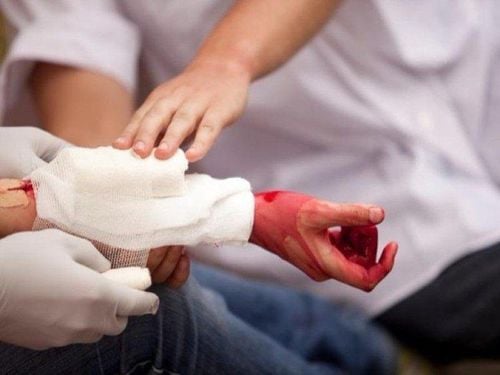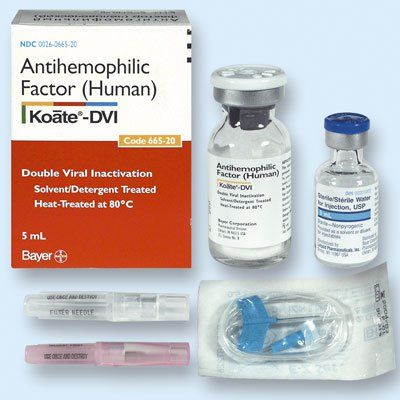This is an automatically translated article.
Monoclate-P is used before surgery to control and stop bleeding episodes in people with low factor VIII levels (hemophilia A), who are at risk of bleeding for longer after trauma, surgery, and bleeding. blood inside the body (especially into joints and muscles).1. What does Monoclate-P do?
Monoclate-P contains human factor VIII, also known as anti-aerophilic factor. This product is used to temporarily replace the missing factor VIII, a protein (clotting factor) found in the blood, so that the blood can clot and stop bleeding.Monoclate-P is indicated in the following cases:
Hemophilia A Bleeding in hemophilia A Prevent bleeding in people with hereditary factor VIII deficiency. Monoclate-P is contraindicated in the following cases:
Blockage of blood vessels due to blood clots. 2. How to use Monoclate-P Monoclate-P is administered intravenously, usually for 5 to 10 minutes or as directed by your doctor. The medicine may need to be given into a vein for a shorter or longer time depending on your dose and how you respond to it. After you first use Monoclate-P at a hemophilia center or hospital, some patients are able to self-administer it at home. If your doctor directs you to use this medication at home, read the product information available from your doctor before you start using it and each time you get a refill. If Monoclate-P and the mixing solution have been stored in the refrigerator, let both come to room temperature before combining. After adding the solution to the powder, some brands of Monoclate-P may ask you to shake the vial for 10 to 15 seconds before gently swirling the vial to dissolve the powder completely. Ask your doctor about the proper way to mix the medicine. Before using Monoclate-P, visually inspect the vial for particles or discoloration. The dose of Monoclate-P is calculated based on your medical condition, weight, blood test results, and response to treatment. Use the medication as directed by your doctor carefully. You also need to learn how to safely store and dispose of needles and medical supplies. Blood tests such as factor VIII levels should be performed regularly to determine your Monoclate-P dose and to check how well the medicine is working. Tell your doctor if your condition does not improve or if it worsens after using Monoclate-P.

Thuốc Monoclate-P được sử dụng trước phẫu thuật để kiểm soát và ngăn chặn các đợt chảy máu ở những người có mức yếu tố VIII thấp (hemophilia A)
3. Side effects of Monoclate-P
During the use of Monoclate-P, flushing, nausea, vomiting and tachycardia may occasionally occur, which can be alleviated by giving the injection at a slower rate. Burning/redness/irritation at the injection site, fever, chills, and headache may also occur. If any of these side effects persist or get worse, tell your doctor right away.Tell your doctor right away if any of the following serious side effects occur: Signs of anemia (e.g. Fatigue, low energy, pale skin color, trouble breathing), bleeding /new or worse bruising.
Tell your doctor right away if you develop any signs of hepatitis or other infection, including: Fever, persistent sore throat, unusual tiredness, unusual drowsiness, joint pain, sadness persistent vomiting/vomiting, stomach/abdominal pain, yellowing eyes/jaundice, dark urine.
A very serious allergic reaction to Monoclate-P is very rare. However, if you notice any symptoms of a serious allergic reaction to Monoclate-P, including: Rash, itching/swelling (especially of the face/tongue/throat), trouble breathing, dizziness severe face, chest tightness, seek immediate medical attention.
This is not a complete list of the possible side effects of Monoclate-P. If you notice other side effects of Monoclate-P not listed above, contact your doctor right away.

Trong quá trình sử dụng thuốc Monoclate-P, đôi khi có thể xảy ra hiện tượng đỏ bừng mặt, buồn nôn, nôn và tim đập nhanh
4. Measures to prevent side effects of Monoclate-P
Before using Monoclate-P, tell your doctor if you are allergic to any product with factor VIII; or natural rubber/latex (available in some brands' packaging) and any other allergies if applicable. Monoclate-P products may contain ingredients that do not work and that may cause allergic reactions or other problems. Before using Monoclate-P, tell your doctor your medical history. The manufacturers of some brands of Monoclate-P drugs recommend monitoring your heart rate during treatment. If your heart starts to beat faster, you should give the medicine at a slower rate or temporarily stop the injection until your heart rate returns to normal. For women during pregnancy, Monoclate-P should be used only when clearly needed. Talk to your doctor about the risks and benefits of the drug for you. It is not known whether Monoclate-P passes into breast milk, so it is best for nursing women to consult their doctor before use.5. Monoclate-P . drug interactions
Do not stop or change the dosage of any medicine while using Monoclate-P without your doctor's consent. Before using Monoclate-P, tell your doctor about all prescription and over-the-counter herbal/prescription products you use.
Trước khi sử dụng thuốc Monoclate-P, hãy nói với bác sĩ của bạn về tất cả các sản phẩm thảo dược / thuốc bạn đang dùng
6. What to do if you overdose or forget to take Monoclate-P?
If you or someone else has overdosed on Monoclate-P and has severe symptoms such as fainting or difficulty breathing, call 911 right away. It is important to follow the Monoclate-P dosing schedule as directed by your doctor. If you miss a dose, contact your doctor to set up a new dosing schedule.7. How to store Monoclate-P
Store Monoclate-P according to the manufacturer's instructions. Some brands of this medicine can only be used for a few months if stored at room temperature. Do not freeze the Monoclate-P vial or store it in the bathroom, away from light. After mixing, do not refrigerate Monoclate-P liquid. Use it within 3 hours (unless the product instructions instruct you otherwise) and throw away any unused portion of the medication. Keep Monoclate-P out of reach of children and pets. Dispose of Monoclate-P medication appropriately when it has expired or is no longer needed.Please dial HOTLINE for more information or register for an appointment HERE. Download MyVinmec app to make appointments faster and to manage your bookings easily.
Reference source: Webmd.com












